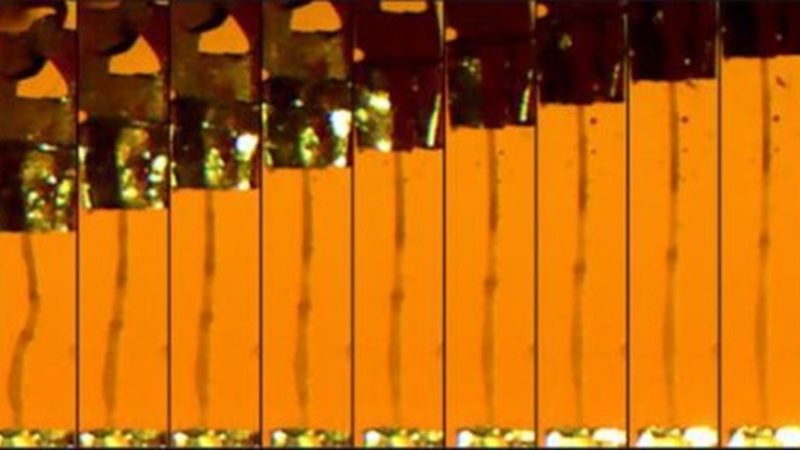Materials Science Applications
Aurora Scientific’s unique Dual-Mode muscle lever aids a variety of researchers looking at materials such as MEMS, hydrogels, artificial muscle, nanowires and carbon fibers. Easily and accurately measure tensile strength, elasticity, detaching force, shear fracture and deformation of most materials with the control and measurement of both force and length. Other Aurora Scientific products useful in materials research include our line of high-speed length controllers and our ultra-low compliance, high-sensitivity force transducers.
Key Aurora Scientific materials science research applications are listed below.
Artificial Muscle & Physiological Tissue
Synthetic muscle and physiological tissue have been shown to have the potential to be hundreds of times stronger than our own muscles. The aim is to design and create materials that match the mechanistic properties of natural muscle and connective tissue.
Studying the body’s tissue, how it grows and how it recovers from an injury in order to produce artificial constructs, requires specialized material testing instruments that can handle the high rates of stress and strain they are subjected to. Aurora Scientific assists researchers in improving these synthetic tissues by producing instruments that facilitate the study of their mechanical properties.
Common Applications:
- connective tissue
- muscle tissue
- epithelial tissue
- tendon injury
- tendon mechanics
Suggested Resources:
- Ong et al. “Epicardially secreted fibronectin drives cardiomyocyte maturation in 3D-engineered heart tissues” Stem Cell Reports (2023) DOI: 10.1016/j.stemcr.2023.03.002
- Wang et al. “Bioengineered 3D Skeletal Muscle Model Reveals Complement 4b as a Cell-Autonomous Mechanism of Impaired Regeneration with Aging” Advanced Materials (2023) DOI: 10.1002/adma.202207443
- Fujiwara et al. “ERRg agonist under mechanical stretching manifests hypertrophic cardiomyopathy phenotypes of engineered cardiac tissue through maturation” Stem Cell Reports (2023) DOI: 10.1016/j.stemcr.2023.09.003
Biomaterials & Polymers
Biomaterials and electroactive polymers are designed to interact with or potentially replace various biological systems. Constructs such as contact lenses, actuators or sensors have been implemented to alter the physiology or performance of systems and therefore require a level of compliance to prevent damage or irritation or mimic the mechanics of a system. Aurora Scientific assists researchers in improving these materials by producing instruments that facilitate the study of the mechanical properties of these materials and how they are able to mimic the characteristics of a natural system.
Common Applications:
- dielectric elastomer actuators
- electroactive polymers (EAPs)
- gels & scaffolds
- electrochemical actuators
- electrothermal actuators
- spider silk
Suggested Resources:
- Nam et al. “Dynamic injectable tissue adhesives with strong adhesion and rapid self-healing for regeneration of large muscle injury” Biomaterials (2024) DOI: 10.1016/j.biomaterials.2024.122597
- Hyun Kim et al. “Neural cell integration into 3D bioprinted skeletal muscle constructs accelerates restoration of muscle function” Nature communications (2020) DOI: 10.1038/s41467-020-14930-9
- Mintz et al. “Long-Term Evaluation of Functional Outcomes Following Rat Volumetric Muscle Loss Injury and Repair” Tissue Engineering Part A (2020) DOI: 10.1089/ten.TEA.2019.0126
Nanomaterials / MEMS
Aurora Scientific instruments are often used to study nanomaterials and MEMS in microfabrication research. Understanding how to improve these materials and how they work requires specialized instrumentation that can resolve the small movements and forces produced. Aurora Scientific transducers and length controllers have been used to help test and improve the unique mechanical properties of various MEMS, microspheres and nanomaterials.
Common Applications:
- carbon nanotubes (CNTs)
- microelectromechanical systems (MEMS)
- microspheres
- fullerenes
Popular Systems:
Suggested Resources:
- Zhang et al. “Improved volatile cargo retention and mechanical properties of capsules via sediment-free in situ polymerization with cross-linked poly(vinyl alcohol) as an emulsifier” Journal of Colloid and Interface Science (2020) DOI: 10.1016/j.jcis.2020.01.115
- Long et al. “Composite microcapsules with enhanced mechanical stability and reduced active ingredient leakage” Particuology (2016) DOI: 10.1016/j.partic.2015.09.003




